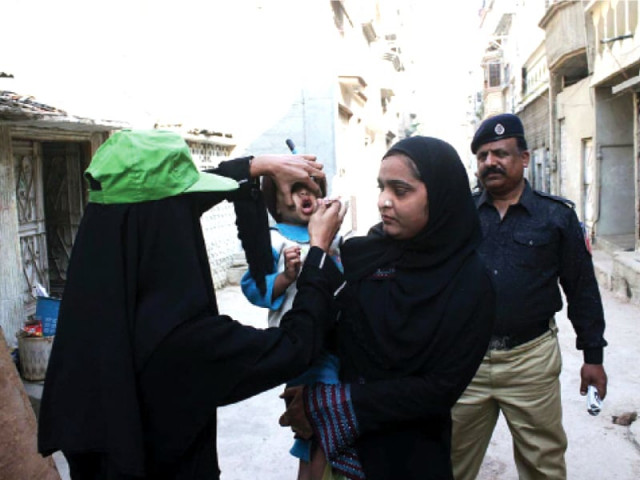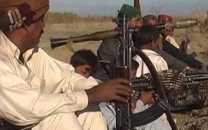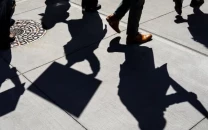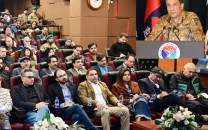Polio drive ends successfully in district Central
Law enforcers cordoned off areas before vaccination teams entered them.

This is a file photo of law enforcement accompanying polio workers. PHOTO: ONLINE
The government’s new strategy of proceeding with the anti-polio campaign in different areas of the city at different times seems to have worked, as authorities announced on Tuesday that they have successfully concluded vaccination drives in Nazimabad, North Nazimabad, Liaquatabad and New Karachi towns of District Central.
Around 210,000 children in these areas were vaccinated in the first round of immunisation that took place after the door-to-door vaccination campaign was suspended last month. The suspension came after four female vaccinators were shot dead in seemingly coordinated attacks in Gulshan-e-Buner at the start of a nationwide polio vaccination drive on December 17. The incidents came after a man associated with a World Health Organisation (WHO) project was shot dead on December 16. The incidents spoke volumes about the resistance faced by healthcare authorities when it came to eradicating polio. Health workers started fearing for their lives. It also didn’t help that some families refused to get their children vaccinated after taking stock of conspiracy theories that said that medicines lead to infertility. Militant organisations, such as the Tehreek-e-Taliban Pakistan, have also issued fatwas, or religious decrees, against vaccinations. The last round of the polio immunisation campaign hoped to target 4.4 million children in 22 districts in Sindh.

The door-to-door immunisation campaign finally resumed in Karachi on January 6, after the government had devised a new strategy for the drive. It conducted surveys of several areas in the city, and then decided to conduct the campaign in different areas, at different times, instead of proceeding with a city wide drive at once.
A central part of the new strategy was, however, the deployment of Rangers and police personnel with vaccination teams. Law enforcement personnel would cordon off an area before a team of vaccinators entered it. A team of policemen on motorcycles would then accompany the vaccinators as they made door-to-door rounds.
Security satisfactory
Members of the vaccination teams appeared satisfied with the level of security they had been provided. “We were not afraid as the police and Rangers personnel were with us,” said Samina Ahmed, a lady heath worker who took part in the immunisation campaign in North Nazimabad. “I wish these personnel were deployed last month, when our colleagues were gunned down.”
Deputy commissioner Dr Saifur Rehman appreciated the joint efforts of health, administration and law enforcement departments in making the drive successful.
Parents’ response
“We were worried after the campaign was suspended last month,” said Amina, mother of a three-year-old girl, who was standing outside her house in Nazimabad. “It was unfair that they stopped the campaign all over the country due a few people against it. There must be some difference between educated and uneducated people.” Ahmed said that the parents’ response to the drive was also good this time around, as the presence of security forces seemed to have removed any fear they might have had about getting their children vaccinated. Nearly 542 vaccinators had taken part in the drive.
Sindh faring better than K-P
According to the WHO, polio remains endemic in only three countries: Pakistan, Afghanistan and Nigeria. During the last 13 months, 34 polio cases have been reported in Pakistan, including four from Sindh, and none from Karachi. The bulk of the cases were reported from Khyber-Pakhtunkhwa and the Federal Administered Tribal Areas.
Published in The Express Tribune, January 9th, 2013.



















COMMENTS
Comments are moderated and generally will be posted if they are on-topic and not abusive.
For more information, please see our Comments FAQ